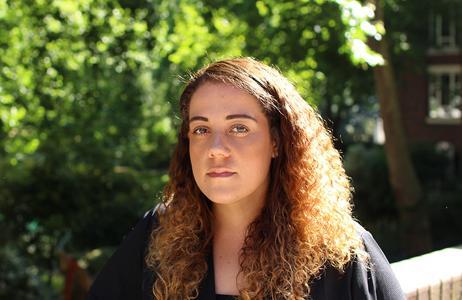Danielle Manson

Tell us about your background and why you decided to become a barrister.
I grew up on a council estate in inner city Nottingham where there were high rates of gun crime, drug use and drug dealing. My mum raised me as a single parent as my dad was in prison. There was, therefore, more chance of me ending up in the dock as opposed to representing anyone else.
Then, at ten years old my mum (a qualified English teacher and woman of good character) was charged with a serious criminal offence. After a lengthy trial, she was acquitted and has spent the last 20 years trying to piece her life back together. I became a criminal barrister for her, having recently completed pupillage and the vocational stage of training.
I chose to practice in crime as a result of my family's experience of the criminal justice system and a desire to represent the most vulnerable and marginalized in our society.
I attended state school before studying law at the University of Sheffield on a partial scholarship. After graduation, (not having undertaken a single mini-pupillage or moot or knowing anyone in the field) I was fortunate enough to secure a job as the junior clerk at Doughty Street Chambers where I worked for a year, learning every day what the reality of life as a barrister was like. I spent my time as a clerk photocopying, carrying boxes and sorting out the post but the experience proved to be invaluable and very much confirmed that being a barrister is the demanding, highly stimulating career I want.
Did you face any obstacles along your journey to becoming a barrister and how did you overcome them? Have any of them persisted since becoming a barrister?
The prospect of joining a profession such as the Bar at times seemed unattainable for someone like me; the cost of training (an eye-watering £18,000 on top of my undergraduate debt), the competitive nature of securing pupillage (some chambers receiving in excess of 300 applications for one place), and the perception that the profession is only open to a certain type of candidate were all reasons for me to self-eliminate. My advice to anyone with similar concerns is to persevere regardless. Do not limit your own aspirations. You could be just what the profession needs.
What opportunities, support and encouragement did you receive along your journey to becoming a barrister?
I was (and continue to be) supported by some wonderful organisations; Lincoln's Inn having awarded me the Lord Denning Scholarship to support my BPTC studies and the Kalisher Trust, who funded an internship at JUSTICE, where I worked on criminal justice policy reform.
Above and beyond any financial support, I have also been encouraged, championed, mentored, inspired (and sometimes informally reprimanded) by senior members of the profession who have invested their time and energy in me. This really has made all the difference. I don't want to embarrass anyone by naming individuals publicly, but I hope if they are reading this they know who they are and how much I value their support.
What is the most rewarding thing about being a barrister; has life at the Bar met your expectations?
My Pupil Supervisor once told me, 'it is a privilege to be a criminal barrister'. To be entrusted with the administration of justice (and consequently an individual's liberty), is perhaps one of the greatest honoursandone of the greatest responsibilities there is. And it's true. Being a barrister is definitely one of the best jobs in the world and has met and exceeded all my expectations.
What are the challenges facing today's aspiring barristers, and how could they be addressed?
The Bar is a profession not without challenge and even now qualified, there are times where I struggle with the economic and cultural reality of what life as a self-employed barrister entails. With payment of fees being sporadic and the travel costs extremely high, there were days during pupillage where I had to buy my lunch using my Boots Advantage Card points.
I am so pleased to see that the Bar Standards Board have adopted a recommendation to increase the minimum pupillage award and set it in line with the Living Wage Foundation's recommendation. This will make a huge difference and is certainly a step in the right direction!
What advice would you give someone from a non-traditional background, seeking to succeed at the Bar?
Despite the challenges, I would encourage anyone from a similar background to pursue a career at the Bar; particularly in crime. It is hard work, relentless and both physically and mentally exhausting but in my opinion, the job satisfaction far exceeds the pitfalls.
My top tips; be resilient. The Bar is a profession with a lot to offer, but it is extremely competitive and you will experience knockbacks during your own journey. They key is to turn any sort of rejection into an opportunity to learn and try not to be too self-critical. Ensure you have a good network to support you when things get tough and retain perspective at all times.